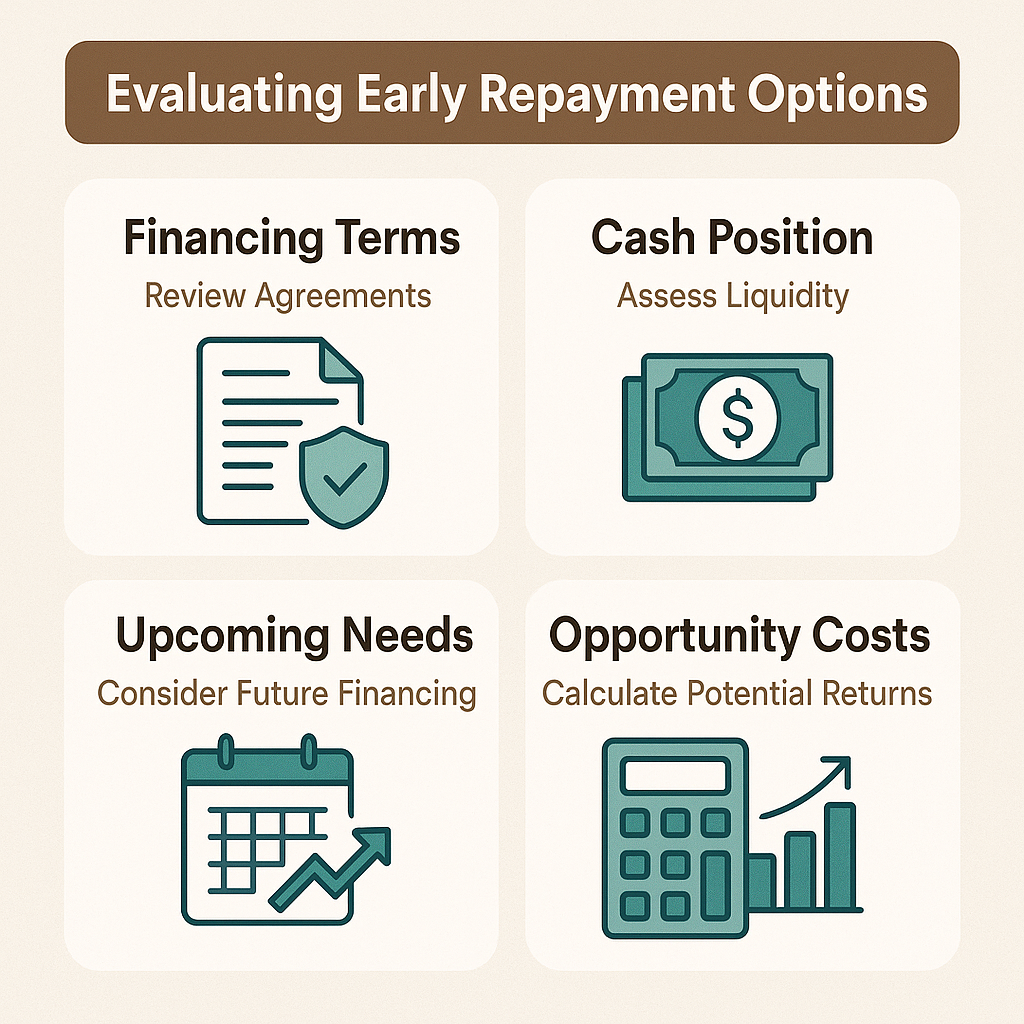When your business has extra cash on hand, paying off financing early might seem like a smart financial move. However, the decision to repay funding ahead of schedule involves several considerations that could impact your business differently depending on your specific situation and financing terms.
Key Benefits of Early Repayment
Understanding the key benefits of early repayment can help you evaluate whether this strategy aligns with your business goals. These advantages often make early repayment an attractive option for businesses with strong cash flow.
- Interest cost savings: Paying off financing early typically reduces the total amount of interest or fees you'll pay over the life of the funding, potentially saving your business money in the long term.
- Improved credit profile: Early repayment may demonstrate financial responsibility to future lenders and could positively impact your business credit history and borrowing capacity.
- Reduced monthly obligations: Eliminating financing payments frees up monthly cash flow that can be redirected toward business growth, inventory, or other operational needs.
- Peace of mind: Being debt-free often provides psychological benefits and reduces financial stress, allowing you to focus entirely on running and growing your business.
Potential Drawbacks to Consider
While early repayment offers several benefits, potential drawbacks to consider might make keeping your current payment schedule more advantageous for your business situation.
- Prepayment penalties: Some financing agreements include prepayment fees that could offset the interest savings, making early repayment less financially beneficial than originally calculated.
- Cash flow impact: Using available cash for early repayment might leave your business with insufficient working capital for unexpected expenses, seasonal fluctuations, or growth opportunities.
- Lost investment opportunities: The money used for early repayment could potentially generate higher returns if invested in business expansion, marketing, or other revenue-generating activities instead.
- Tax considerations: Interest payments on business financing are often tax-deductible, so early repayment might reduce your available deductions and increase your overall tax burden.
Steps to Evaluate Your Options

Following a systematic approach to evaluate your options ensures you make the most informed decision about early repayment based on your unique business circumstances.
- Review your financing terms: Examine your agreement for prepayment penalties, discount opportunities, and calculate the exact savings from early repayment versus continuing with scheduled payments.
- Assess your cash position: Determine how much cash you would have remaining after early repayment and whether this amount provides adequate liquidity management for your business operations.
- Consider upcoming needs: Evaluate whether you might need additional financing soon, as paying off current funding early could affect your borrowing capacity or relationship with lenders.
- Calculate opportunity costs: Compare the cost savings from early repayment against potential returns from investing that money in business growth initiatives or other opportunities.
Making the Right Decision
The early repayment pros and cons vary significantly depending on your business model, cash flow patterns, and growth plans. Businesses with steady, predictable income might benefit more from early repayment than those with seasonal or variable revenue streams.
Consider your industry's typical cash flow cycles and whether maintaining financing provides a safety net during slower periods. Some businesses find that keeping structured payments helps with budgeting and cash flow forecasting, even when they could afford to pay early.
Your decision should also factor in your relationship with your current lender and whether early repayment might affect future financing opportunities. Some lenders view early repayment favorably, while others prefer clients who complete their full payment terms as agreed.
Early repayment decisions require careful evaluation of your specific financial situation, business goals, and the terms of your current financing. While cost savings and reduced obligations are appealing, maintaining adequate cash reserves and considering opportunity costs are equally important for long-term business success.

.png)






